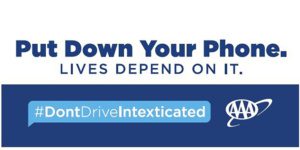BOISE – AAA is asking drivers to consider the use of cell phones and other mobile devices to be just as dangerous as drinking alcohol and getting behind the wheel. AAA’s “Don’t Drive Intoxicated, Don’t Drive Intexticated” safety campaign kicks off Distracted Driving Awareness Month, moved from April to October due to the COVID-19 pandemic. AAA will share the message on billboards and social media, and in its brick-and-mortar Service Centers.

“Most people would never drive under the influence of alcohol. Yet they may not realize how many bad things can happen while they’re looking down at a screen,” says AAA Idaho spokesman Matthew Conde. “We hear some pretty sad stories about people who were texting, watching videos, vlogging, checking email, or using social media right before a devastating accident. They experienced situational blindness and slower reaction time while they traveled the length of several football fields – similar to what you might see with drug and alcohol use.”
According to the Idaho Transportation Department, a crash occurred every 20 minutes last year, with someone killed in an impaired driving crash every four days. Distracted driving crashes were up seven percent and represented 19 percent of all crashes and 16 percent of all fatalities. The economic cost of distracted driving crashes in the Gem State was nearly $787 million in 2019. But distracted driving can be difficult to prove, and the actual totals could be much higher.
“It’s important to not think of this as a ‘city problem’ or something that can only get people hurt on the freeway,” Conde said. “ITD’s report shows that 76 percent of all distracted driving crashes happened on urban roadways, but 64 percent of the traffic fatalities occurred in rural areas.”
Distracted drivers put themselves, their passengers, pedestrians, bicyclists and people in other vehicles at risk. AAA encourages drivers to avoid distractions of any kind.
Keys to reduce distracted driving
- Remember the law. On July 1, Idaho’s ban on handheld mobile devices went into effect. Beginning January 1, drivers who hold their phones to talk and type could face fines and other penalties, so now is a good time to practice putting the phone away.
- Set a good example. Please remember that your kids will watch and imitate your driving behavior – good or bad.
- Rely on a trusty co-pilot. Have a passenger respond to texts and look up directions. Keep your eyes and attention on the road.
- Have the courage to speak up. As a passenger, it’s okay to ask the driver to ditch the distractions and focus on reaching your destination safely.
- Don’t wear ear buds or headphones in both ears. They can prevent you from hearing important information, like a car or train horn, a screeching tire, or an emergency siren.
- Be a good pedestrian/cyclist. If you’re out getting some exercise, stay alert. Don’t walk or bike while looking down at your phone, especially while crossing the street.
“When it comes to cell phones, we all need to have the self-discipline to say, ‘It can wait,’” Conde said. “There are very few things that are worth putting people’s lives and safety at risk.”

